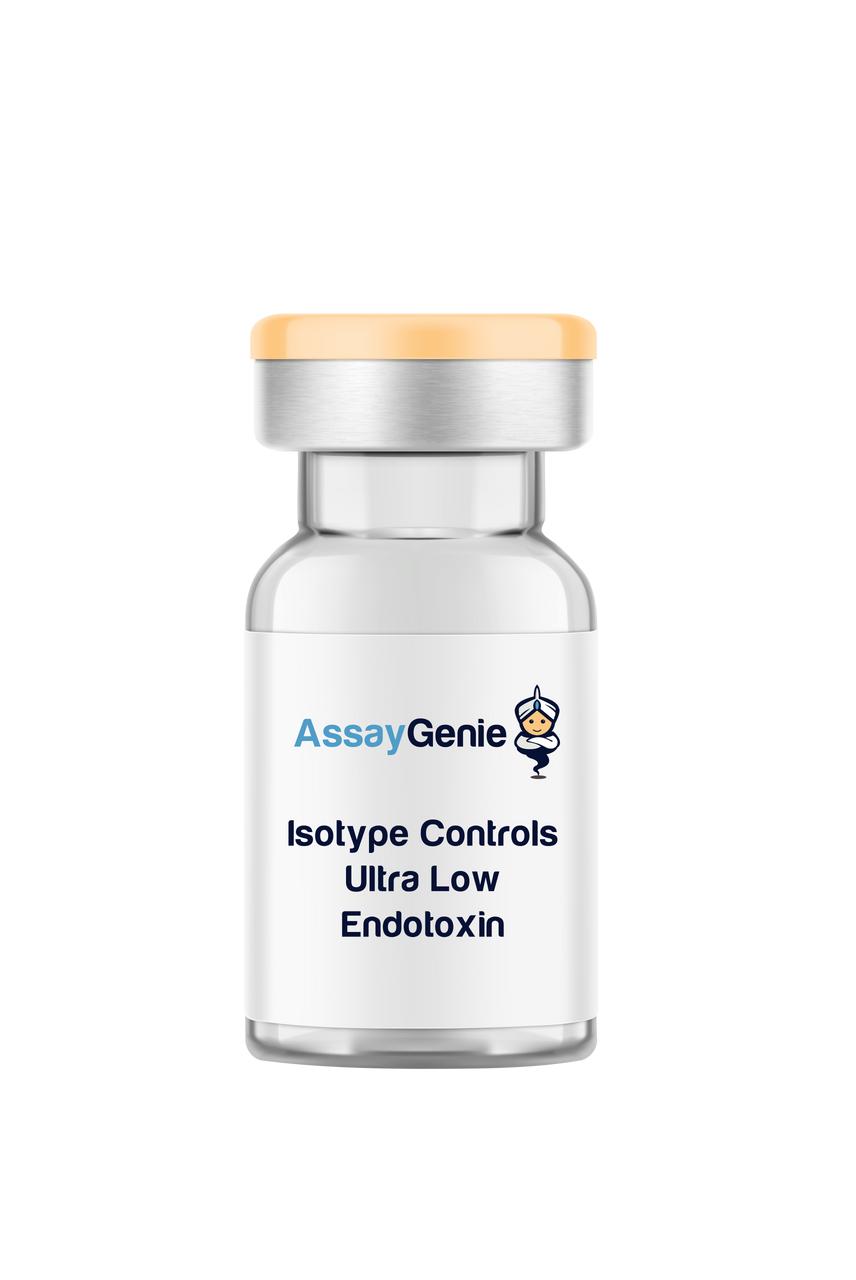Description
Anti-Human CD3 In Vivo Antibody - Ultra Low Endotoxin
Introducing the Anti-Human CD3 In Vivo Antibody - Ultra-Low Endotoxin from Assay Genie, a highly specific monoclonal antibody designed for in vivo applications. This antibody targets the CD3ε chain, a critical component of the T-cell receptor (TCR) complex involved in the activation and signal transduction of T-cells, making it indispensable for research in immunology and related fields. With a mouse IgG2a isotype, it offers high purity and ultra-low endotoxin levels (<0.001 EU/μg), ensuring minimal interference in sensitive experiments such as ELISA, flow cytometry, immunohistochemistry, and other assays.
Available in various sizes, it is formulated in phosphate-buffered saline for optimal stability and efficacy. Enhance your research with this dependable and versatile antibody. CD3 is a protein complex and T-cell co-receptor that is expressed on all mature T lymphocytes. It plays a pivotal role in the adaptive immune response by initiating T-cell activation through recognition of antigens presented by the major histocompatibility complex (MHC) molecules.
| Product Name: | Anti-Human CD3 In Vivo Antibody - Ultra Low Endotoxin |
| Product Code: | IVMB0118 |
| Size: | 1mg, 5mg, 25mg, 50mg, 100mg |
| Clone: | UCHT-1 |
| Protein: | CD3 |
| Product Type: | Monoclonal Antibody |
| Synonyms: | T3, CD3-epsilon |
| Isotype: | Mouse IgG1 κ |
| Reactivity: | Human |
| Immunogen: | Unknown |
| Applications: | CyTOF®, FC, IF Staining, IHC FF, IP, PhenoCycler®, WB\nWorkshops III 471 |
| Formulation: | This monoclonal antibody is aseptically packaged and formulated in 0.01 M phosphate buffered saline (150 mM NaCl) PBS pH 7.2 - 7.4 with no carrier protein, potassium, calcium or preservatives added. |
| Endotoxin Level: | <0.5 EU/mg as determined by the LAL method |
| Purity: | ≥98% monomer by analytical SEC >95% by SDS Page |
| Preparation: | Functional grade preclinical antibodies are manufactured in an animal free facility using only In vitro protein free cell culture techniques and are purified by a multi-step process including the use of protein A or G to assure extremely low levels of endotoxins, leachable protein A or aggregates. |
| Storage and Handling: | Functional grade preclinical antibodies may be stored sterile as received at 2-8°C for up to one month. For longer term storage, aseptically aliquot in working volumes without diluting and store at -80°C. Avoid Repeated Freeze Thaw Cycles. |
| Applications: | CODEX®, CyTOF®, FC, IF Staining, IHC FF, IP, WB |
| Recommended Usage: | FC The suggested concentration for this UCHT-1 antibody for staining cells in flow cytometry is ≤ .25 µg per 106 in a volume of 100 µl or 100µl of whole blood. Titration of the reagent is recommended for optimal performance for each application. WB |
| Reactivity: | Human |
| Host Species: | Mouse |
| Specificity: | Clone UCHT-1 recognizes an epitope on human CD3-epsilon. |
| Antigen Distribution: | CD3 is expressed on human peripheral blood lymphocytes, splenic lymphocytes, and the majority of T-CLL and T-ALL cells. |
| Immunogen: | Unknown |
| Concentration: | ≥ 5.0 mg/ml |
| Endotoxin Level: | <0.5 EU/mg as determined by the LAL method |
| Purity: | ≥98% monomer by analytical SEC >95% by SDS Page |
| Formulation: | This monoclonal antibody is aseptically packaged and formulated in 0.01 M phosphate buffered saline (150 mM NaCl) PBS pH 7.2 - 7.4 with no carrier protein, potassium, calcium or preservatives added. |
| Preparation: | Functional grade preclinical antibodies are manufactured in an animal free facility using only In vitro protein free cell culture techniques and are purified by a multi-step process including the use of protein A or G to assure extremely low levels of endotoxins, leachable protein A or aggregates. |
| Storage and Handling: | Functional grade preclinical antibodies may be stored sterile as received at 2-8°C for up to one month. For longer term storage, aseptically aliquot in working volumes without diluting and store at -80°C. Avoid Repeated Freeze Thaw Cycles. |
CD3ε is a 20kDa subunit of the TCR complex and is a transmembrane T-cell surface glycoprotein that belongs to the Ig superfamily. It is one of five polypeptide chains that form the TCR complex by associating with the CD3δ, γ and ζ chains, in addition to the TCR α/β or γ/δ chains. CD3 is involved in TCR signaling, enumeration of immunocompetent T-lymphocytes in peripheral blood, and signal transduction during antigen recognition.
| Technical Datasheet: | View |
| Protein: | CD3 |
| Function: | Antigen recognition, signal transduction, T cell activation |
| Ligand/Receptor: | Peptide antigen bound to MHC |
| Research Area: | Immunology |

| Mouse IgG1 Isotype Control [HKSP84] | |
|---|---|
| Clone | HKSP84 |
| Isotype | Mouse IgG1 |
| Endotoxin Level | Ultra Low Endotoxin |

| Mouse IgG1 Isotype Control [HKSP] | |
|---|---|
| Clone | HKSP |
| Isotype | Mouse IgG1 |
| Endotoxin Level | Ultra Low Endotoxin |



![Anti-Human CD3 [UCHT-1] In Vivo Antibody - Low Endotoxin Anti-Human CD3 [UCHT-1] In Vivo Antibody - Low Endotoxin](https://cdn11.bigcommerce.com/s-h68l9z2lnx/images/stencil/590x590/products/214452/569375/anti-human-cd3-ucht-1-in-vivo-antibody-low-endotoxin__97011.1673496659.jpg?c=2)


